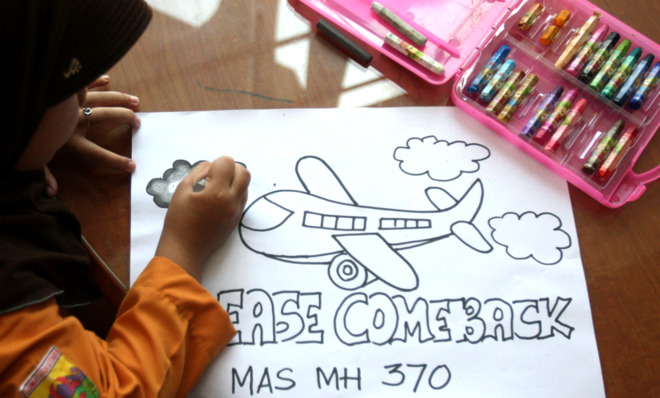What our obsession with Malaysia Flight 370 says about us
Technology and modernity are not the protective shields we imagine


Let's face it: We are obsessed with Malaysia Airlines Flight 370. Indeed, conspiracy theorists probably haven't had this much material since the JFK assassination.
Maybe the flight landed on a remote air strip. Perhaps it evaded detection by "shadowing" another plane. Maybe aliens were involved? Don't rule out terrorism. Maybe the pilots committed suicide? Or maybe the passengers and crew were just the tragic victims of a fire.
Why do we obsess this way? Is there a primal reason we are drawn to such stories and, yes, to conspiracy theories explaining them?
The Week
Escape your echo chamber. Get the facts behind the news, plus analysis from multiple perspectives.

Sign up for The Week's Free Newsletters
From our morning news briefing to a weekly Good News Newsletter, get the best of The Week delivered directly to your inbox.
From our morning news briefing to a weekly Good News Newsletter, get the best of The Week delivered directly to your inbox.
Maybe we need these theories to psychologically process tragedies, particularly of the mysterious variety. In this regard, speculation comforts us. "It's unnerving to think there are gangs of giant lizards controlling the whole of mankind from the shadows," writes Dean Burnett at The Guardian, "but is that less worrying than the possibility that we live in a random universe where unthinking forces could opt to snuff us out without cause or reason?"
Of course, the missing Malaysian plane doesn't have nearly the same historic or political importance as the assassination of an American president — even though the potential loss of life in the case of Flight 370 is far greater than what America experienced in Dallas in 1963. But the missing flight and JFK assassination do have this in common: Both undermined our naive faith in modernity.
The Kennedy assassination shattered a generation's innocence, dramatically altering the nation. It seemed unthinkable that the most powerful man in the world — so handsome, so well-born, so intelligent — could be killed by a gunman in the streets of a safe American city. But since JFK's death, many of us live in a state of somewhat constant apprehension over similar tragedies striking.
The disappearance of Malaysia Airlines Flight 370 taps into similar primal fears, exposing a shocking naïveté about the amount of control you and I really have over the world. Many of us like to think, when we're speeding through the sky in a metal tube, that some technician is sitting in front of a computer somewhere on the ground, following our progress with a pointed finger tracking a blinking green dot across a radar screen.
A free daily email with the biggest news stories of the day – and the best features from TheWeek.com
This is just not so.
It's hard to believe that in 2014 we cannot find a missing airplane. This goes against everything we've been led to believe about our shrinking world, about Big Brother's ability to track us every second of the day (they may invade our privacy, but at least they keep us safe!), and about a culture that believes we are all, to some degree or another, protected.
"We almost sort of have this idea that every square foot of the planet is under some level of observation," observed Chuck Klosterman on The BS Report podcast, before noting that something like a measly 6 percent of the ocean floor has been explored.
Despite all of our technological advances, despite the many debates about the surveillance state, despite decades-old fears about the 1984-ization of our world, the huge bulk of our planet and our lives on it remain a mystery. The light of modernity shines only so far. The rest is a dark unknown.
The disappearance of this plane also clearly taps into some innate suspicion many of us have that the world actually isn't so safe after all, that the talisman of technology is not all-powerful. What else explains the abundance of films and TV shows about modern people whose planes crash, leaving them presumed dead and left to fend for themselves in a strange and scary place? These films haven't disappeared in recent years the way that other plot devices of the pre-cell phone era have. If anything, they are more prevalent, perhaps because they tap into some deep-seated fear or suspicion we have about our inability to control a wild, wild world.
Matt K. Lewis is a contributing editor at TheWeek.com and a senior contributor for The Daily Caller. He has written for outlets including GQ Politics, The Guardian, and Politico, and has been cited or quoted by outlets including New York Magazine, the Washington Post, and The New York Times. Matt co-hosts The DMZ on Bloggingheads.TV, and also hosts his own podcast. In 2011, Business Insider listed him as one of the 50 "Pundits You Need To Pay Attention To Between Now And The Election." And in 2012, the American Conservative Union honored Matt as their CPAC "Blogger of the Year." He currently lives in Alexandria, Va.
-
 Received a gift card this holiday season? Here’s how to maximize it.
Received a gift card this holiday season? Here’s how to maximize it.The Explainer Make the most of your present
-
 ‘Lumpy skin’ protests intensify across France as farmers fight cull
‘Lumpy skin’ protests intensify across France as farmers fight cullIN THE SPOTLIGHT A bovine outbreak coupled with ongoing governmental frustrations is causing major problems for French civil society
-
 The best books of 2025
The best books of 2025The Week Recommends A deep dive into the site of a mass shooting, a new release from the author of ‘Atonement’ and more
